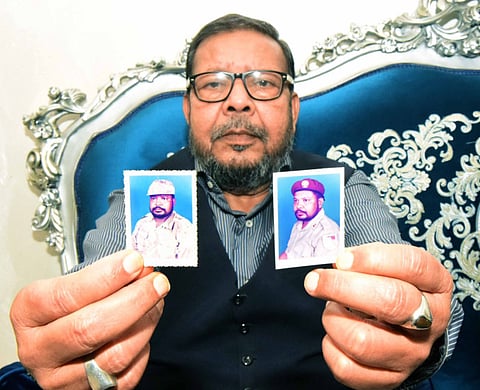‘I was prepared to die for the UAE’
Indian expat soldier says he slept in his boots, battle-ready, during the First Gulf War

Dubai: The ageing yellowed contract may make it seem like it was just another job, but for Saeed Peter his spell in the UAE Armed Forces meant a lot more.
All that’s left from the 69-year-old Indian expatriate’s service between 1988 and 1990, when he served in the ammunitions and maintenance regiment during the First Gulf War, are a few documents, some pictures and an old army issue sewing kit, which he clasps in his hands as he looks wearily out to sea from his apartment window on Ajman Corniche.
“I was prepared to die for the UAE,” he explains, “But by the grace of God there was no order to move forward.”
His was a role behind the infantry, but in the end he was never called into Kuwait to defend it from Saddam Hussain’s advancing Iraqi forces. He was, however, on 24-hour alert in the UAE in case Saddam’s troops made it any further across the Arabian Peninsula.
“It was a difficult time, we slept in our boots and even prayed with them on as we stayed packed and ready to go if ever the order came.
“One missile from Iraq landed in the sea off Khor Fakkan and although nothing fell in land we were all worried.
I was prepared to die for the UAESaeed Peter
“As soldiers we were taught not to be afraid and to stay mentally strong but it wasn’t always easy.
“When Saddam burnt the oilfields in Kuwait it also affected the climate and the atmosphere here. I felt sure then that anything could happen and was prepared to make the ultimate sacrifice.”
Luckily though the order never came, Saddam’s troops retreated after allied intervention, and those who had been on high alert were sent home for rest and recuperation with their families.
It was while in India on leave that Saeed received the call that expatriates would be decommissioned from the UAE Armed Forces, with a three month pay-off.
“I was seriously hurt and questioned how I would support my family now that my job was gone,” added Saeed, who was 40 at the time and earning about Dh5,000 a month.
Rather than return home for good however, Saeed — an engineer by trade — decided to stay in the UAE and brought his family over in 1994.
“The reason he came to the UAE in the first place was for a job but then it became something else and that something else is the reason we are all still here,” said Saeed’s daughter Aisha, 32, who says her father remains utterly devoted to the UAE, despite his struggles working odd jobs in construction, and a recent heart bypass in 2015 that has left him unable to work.
Recalling fondly of how the UAE has grown into a peaceful and tolerant society within which to bring up his three children, a son and two daughters, Saeed admits that the UAE now feels much more like home than his native Lucknow, and despite the struggles, which he says are part of life and would have occurred anywhere, he maintains he would never want to live anywhere else.
“He grew an attachment to this place and was willing to make the biggest sacrifice to serve this country as his own,” said Saeed’s son Ebrahim, 28.
“This,” added Ebrahim of what’s now left of his father’s military file, which is scattered across a coffee table with a few pictures. “This is just paperwork, but it can’t document a feeling.”


